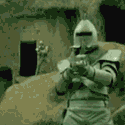|
LeJackal posted:The person known as Batman I have a greater respect for, if no other reason than his honesty. Batman does not wish to conquer and be celebrated for his tyranny, he merely wishes to beat criminals senseless. In addition, he puts his life on the line for his city and his people, risking death and ruination. Batman may not be mentally stable, but he is in many ways a noble human being. He also likes to dress up young boys in skin tight brightly colored clothing. Uhm, yeah.
|
|
|
|

|
| # ? Apr 29, 2024 17:00 |
|
LeJackal posted:The person known as Batman I have a greater respect for, if no other reason than his honesty. Batman does not wish to conquer and be celebrated for his tyranny, he merely wishes to beat criminals senseless. In addition, he puts his life on the line for his city and his people, risking death and ruination. Batman may not be mentally stable, but he is in many ways a noble human being. Also, not to validate that one monologue from Kill Bill too much, but identity and the respective reasoning behind those identities is relevant. "Superman" is more of a superego than a disguise; he's intentionally imagined by Kal-El and Jor-El to be an idealized person. Hiding Clark's human identity isn't really the point, in part because Clark is as invulnerable as Superman is, but also because Clark Kent isn't special and doesn't have many attachments. Rather, the Superman persona is about Clark becoming some aspirational self and advertising that to the world as a symbol of Perfection. "Batman" is different. He's interested in becoming a symbol, but as an intentional abstraction of identity. It isn't about vanity or idealism or ego, but creating an inhuman vessel in service of the utilitarian goals Bruce pursues for Gotham. Pragmatically, Bruce does have a need to obscure his human identity, but also his goal with Batman is ego-less. Batman can be reviled, or scapegoated, or otherwise totally slandered by public opinion, and none of it matters. I mean to say, "Batman" isn't a person, and is never meant to be, which is less condescending if nothing else. My main problem with Superman is that every interesting concept circling the character is better explored through Dr. Manhattan. I'm sure the sequels will delve further into Superman's friction with the US military, and I'm positive it won't be nearly as interesting as the Vietnam / Nixon sections from Watchmen. The trailers for Man of Steel got me momentarily excited, since they emphasized Kal-El's alienation from humanity, but obviously they can't go into the nihilistic psychological place that Dr. Manhattan goes.
|
|
|
|
Xealot posted:Also, not to validate that one monologue from Kill Bill too much, but identity and the respective reasoning behind those identities is relevant. "Superman" is more of a superego than a disguise; he's intentionally imagined by Kal-El and Jor-El to be an idealized person. Hiding Clark's human identity isn't really the point, in part because Clark is as invulnerable as Superman is, but also because Clark Kent isn't special and doesn't have many attachments. Rather, the Superman persona is about Clark becoming some aspirational self and advertising that to the world as a symbol of Perfection.  It's amazing to begin with to see Superman save a life not by punching something, but hearing an act of desperation and giving a much needed hug. What's more important is the message he provides her. In her act of desperation, she's seeing the world as something too much for her and herself as something that cannot take it. Superman's response is that she just can't see how strong she actually is. She's like Clark. She's just an anonymous person doing her best, but Superman's telling her that she is stronger than she understands. His response to her as that they are one in the same even if she can't fully understand that. quote:"Batman" is different. He's interested in becoming a symbol, but as an intentional abstraction of identity. It isn't about vanity or idealism or ego, but creating an inhuman vessel in service of the utilitarian goals Bruce pursues for Gotham. Pragmatically, Bruce does have a need to obscure his human identity, but also his goal with Batman is ego-less. Batman can be reviled, or scapegoated, or otherwise totally slandered by public opinion, and none of it matters. I mean to say, "Batman" isn't a person, and is never meant to be, which is less condescending if nothing else. quote:My main problem with Superman is that every interesting concept circling the character is better explored through Dr. Manhattan. I'm sure the sequels will delve further into Superman's friction with the US military, and I'm positive it won't be nearly as interesting as the Vietnam / Nixon sections from Watchmen. The trailers for Man of Steel got me momentarily excited, since they emphasized Kal-El's alienation from humanity, but obviously they can't go into the nihilistic psychological place that Dr. Manhattan goes. Also, you're not reading Moore right if you're getting nihilism. Just because something is bleak does not mean it is nihilistic.
|
|
|
Xealot posted:My main problem with Superman is that every interesting concept circling the character is better explored through Dr. Manhattan. I'm sure the sequels will delve further into Superman's friction with the US military, and I'm positive it won't be nearly as interesting as the Vietnam / Nixon sections from Watchmen. The trailers for Man of Steel got me momentarily excited, since they emphasized Kal-El's alienation from humanity, but obviously they can't go into the nihilistic psychological place that Dr. Manhattan goes. Superman on the other hand is willing to work with the military but, even before fighting Zod - even before VISITING Zod - he takes great pains to explain that he may be their friend but he is not their tool. Another key difference would be that Jon's pivotal actions involve withdrawing from the world, while Superman is actively involved in the world, taking specific, reasoned actions towards engaging with it. I don't see, I suppose, how an active character here would be more interesting or less interesting, fundamentally, than a passive one such as Dr. Manhattan. If anything I think it would be new to have a filmed superhero acting deliberately contrary to American national policies; the only example I can think of is Tony Stark, and he was doing it 'because it was his stuff' rather than 'because I know better than the American military-industrial complex.'
|
|
|
|
|
Timeless Appeal posted:Also, you're not reading Moore right if you're getting nihilism. Just because something is bleak does not mean it is nihilistic. And really the whole point of Doctor Manhattan is that he realizes the uniqueness of humanity and why it needs to be saved (either by confronting Ozymandias or by leaving so his presence isn't a threat any longer).
|
|
|
|
Timeless Appeal posted:But Clark is special, and that's what makes the Clark/Superman metaphor so elegant. Clark is this anonymous guy who just works hard, acts like a decent person, and tried to get through the day. Clark is an intentionally average guy. He's literally an everyman. That is the definition of "not special." The entire point of Clark Kent is that he's unassuming and average, vs. Superman who is exceptional. "Anonymous guy who works hard and acts like a decent person" is hardly a unique descriptor for anyone, which is the entire point. And I read Moore just fine, thanks. Dr. Manhattan's entire character arc is overcoming nihilism. As in, he does not see the purpose in intervening with human affairs because humanity is self-destructive, and life is a nonessential phenomenon that doesn't have value to him. He literally says, "a dead body has the same number of molecules as a live one; structurally there is no difference." That's not simply "bleak," that's nihilistic. He sees no intrinsic value in life or existence. He ultimately resolves that nihilism at the end of his character arc, but the entire meat of his story is exploring those philosophical questions. That it doesn't end nihilistically doesn't mean those ideas weren't on the table. Edit: ____________________________________ Sorry, this came out substantially douchier than I meant it. Anyway, the reason I conflate Superman and Dr. Manhattan is that they have a similar significance in their respective settings. They're godlike semi-human beings whose presence changes how society functions, from issues of social justice to international military presence. Formerly impossible things are now possible, pending the compliance of these new God figures. They aren't similar personalities at all, as someone else pointed out. But Dr. Manhattan's reaction to the intense expectations placed upon him by humanity does such a good job deconstructing what a Superman figure actually is. I'm generally always looking for a compelling answer to the question, "WHY is Superman helping humanity?" And tons of Superman comics address this, but the ones I've been exposed to have never grabbed me personally the way Watchmen has. Xealot fucked around with this message at 19:07 on Jul 10, 2013 |
|
|
|
Xealot posted:Clark is an intentionally average guy. He's literally an everyman. That is the definition of "not special." The entire point of Clark Kent is that he's unassuming and average, vs. Superman who is exceptional. "Anonymous guy who works hard and acts like a decent person" is hardly a unique descriptor for anyone, which is the entire point. He's surrounded by people like Perry White who can be protective and will defend others. He's surrounded by people like Lois who'll stand up to anyone. I was actually a little disappointed in Jenny because she didn't really have Jimmy's bravery. He was given his values by two farmers on the outskirts of a lovely town in Kansas. He was given life by biological parents whose history has been completely obliterated, but offered him a chance to live based on their belief in the good of others. When it comes to Superman, the nobodies matter. They are special as long as they try to be brace, try to be nice, try to help people, and try to do what is right.  You should read Lex Luthor: Man of Steel, if you haven't though. I think it's very in-line to your views with the character.
|
|
|
|
That's such a hilarious mixed message. What kind of egotistical prick would write his own epitaph on the moon in English, turning a beautiful celestial body into a eyesore and a monument to his vanity.
|
|
|
|
Superman, being ever considerate to the diversity of the human race, towed three extra moons from elsewhere in the Solar System into Earth orbit so that he could write the same message in Mandarin, Spanish, and Arabic.
|
|
|
|
Baron Bifford posted:Superman, being ever considerate to the diversity of the human race, towed three extra moons from elsewhere in the Solar System into Earth orbit so that he could write the same message in Mandarin, Spanish, and Arabic. That hayseed should've graduated high school to see what even one more moon might do to the delicate balance of life on Earth.
|
|
|
|
Timeless Appeal posted:When it comes to Superman, the nobodies matter. They are special as long as they try to be brace, try to be nice, try to help people, and try to do what is right.
|
|
|
|
Superman is often depicted dealing with law-abiding citizens - helping them with some problem, offering a word of encouragement, even just giving a friendly nod. Usually this is in montages, because there's this strange idea that superheroes doing things that aren't fighting to characters that aren't other superheroes is boring, but it's to be understood as something that happens regularly.
|
|
|
|
HUNDU THE BEAST GOD posted:That's such a hilarious mixed message. What kind of egotistical prick would write his own epitaph on the moon in English, turning a beautiful celestial body into a eyesore and a monument to his vanity. Kal-El, pretender to the throne of god. Baron Bifford posted:Superman, being ever considerate to the diversity of the human race, towed three extra moons from elsewhere in the Solar System into Earth orbit so that he could write the same message in Mandarin, Spanish, and Arabic. Kal-El, who is more concerned about appearing to care than actually caring. Baron Bifford posted:Superman, like most comic book heroes, doesn't spend a lot of time dealing with the little people. Quite a lot of stories have him dealing with villains on personal vendettas. Sometimes, these villains may threaten large numbers of innocents, yes, but even then the little people are just extras. Kal-El, who considers the whole human race 'little people'. I believe that no man or alien is good enough to be trusted with uncontrolled power over others. And the higher the pretensions of such power, the more dangerous I think it both to rulers and to the subjects. If we must have a tyrant, a human robber baron is far better than an alien convinced of godhood and moral rightness. The baron's cruelty may sometimes sleep, his cupidity at some point may be sated; and since he dimly knows he is doing wrong he may possibly repent. But the alien who mistakes his own cruelty and lust of power and fear for the voice of his 'perfect ascended morality' will torment us infinitely more because he torments us with the approval of his own conscience and his better impulses appear to him as temptations. A metaphysic held by a ruler with the force of a religion is a bad sign. It forbids him, like the inquisitor, to admit any grain of truth or good in their opponents, it abrogates the ordinary rules of morality, and it gives a seemingly high, super-personal sanction to all the very ordinary mortal passions by which, like other men, the ruler will frequently be actuated. In a word, it forbids wholesome doubt. A political program can never in reality be more than probably right. We never know all the facts about the present and we can only guess the future. To attach to a party program -- whose highest claim is to reasonable prudence -- the sort of assent which we should reserve for demonstrable theorems, is a kind of intoxication.
|
|
|
|
He's actually quite a nice sort once you get to know him.
|
|
|
|
Xealot posted:They aren't similar personalities at all, as someone else pointed out. But Dr. Manhattan's reaction to the intense expectations placed upon him by humanity does such a good job deconstructing what a Superman figure actually is. I'm generally always looking for a compelling answer to the question, "WHY is Superman helping humanity?" And tons of Superman comics address this, but the ones I've been exposed to have never grabbed me personally the way Watchmen has. I really don't understand the question of "Why is Superman helping humanity?". I don't see why people are so interested in it. He's Superman. If he didn't help humanity he wouldn't be terribly Super, or would be quite terribly Super in another sense. I find it pretty amusing that "Why would Superman help humanity?" is such a thing for some people, and that in 2013 people still want to deconstruct him like it's the 80s and Frank Miller hasn't become a gibbering pariah. He helps humanity because he's a SUPER man in more ways than power. He's a good dude with amazing powers. He uses his powers the way any moral person would like to think they would. I mean really, it's thinking like Luthor, to want to see Superman's morality broken down and picked apart. His morality isn't that complicated. Superman has plenty of depth, but his motives aren't really very complicated. He's Superman because he thinks it's the right thing to do. WHY Superman helps out just isn't that interesting a question in my eyes. You trot it out up-front to show his morals/mission, but if one keep harping on it then it just turns into a big wank and the story becomes WHY SUPERMAN DOES instead of WHAT SUEPRMAN DOES. The whole deconstruction act is, to me, getting pretty stale by now. DC is getting real bad about getting their heroes into these weird thought loops, where the films become less about getting you to think about what Superman/Batman does and more about what Superman/Batman means, except it's not about what Superman/Batman means to you, but what Superman/Batman means to Superman/Batman. Sure they have interesting places in the culture, and they're worth examining, but since TDKR I've been getting the feeling DC is flying it's head up it's own rear end in a top hat and getting wrapped up in the heft of their character's importance, to the point where they can't make a fun flashy romp, but instead are stuck in this line of thought that causes them to treat their properties with such heft and portentousness, way way too conscious of their "Important Modern Myths". Also first post. Hello folks.
|
|
|
|
LeJackal posted:I believe that no man or alien is good enough to be trusted with uncontrolled power over others. And the higher the pretensions of such power, the more dangerous I think it both to rulers and to the subjects. If we must have a tyrant, a human robber baron is far better than an alien convinced of godhood and moral rightness. The baron's cruelty may sometimes sleep, his cupidity at some point may be sated; and since he dimly knows he is doing wrong he may possibly repent. But the alien who mistakes his own cruelty and lust of power and fear for the voice of his 'perfect ascended morality' will torment us infinitely more because he torments us with the approval of his own conscience and his better impulses appear to him as temptations. The more alien you make Superman the more likely he could be trusted. We know what humans are like. We don't know if aliens are corruptible. In fact in the movie we're shown that the Kryptonians are largely incorruptible. They follow their ends with all means necessary. You are showing your human xenophobia.
|
|
|
|
Robotnik Nudes posted:Also first post. Hello folks. Hello. Robotnik Nudes posted:I really don't understand the question of "Why is Superman helping humanity?". I don't see why people are so interested in it. He's Superman. If he didn't help humanity he wouldn't be terribly Super, or would be quite terribly Super in another sense. Well, not simply "why," but why he chooses to do it the way he does. Rules don't apply to him, and his power is so substantial almost nobody could stop him from doing whatever he wanted to do. But through happenstance, he internalized very democratic American moral values. In any postmodern context, questions about his patriotism run afoul of systemic criticism of the United States - especially our military presence, but also social and governmental questions about justice. He's one person with the capacity to challenge society, so his action or inaction are both meaningful. For instance, Superman might intervene to help police in a gang shoot-out. But what does that say when systemic baggage about poverty and the urban police state are addressed? Is Superman upholding justice or is he on the side of fascism? In Man of Steel, Superman cooperates with the US military, but it ends with him destroying a surveillance drone. In the era of NSA surveillance and mass citizen protests over power imbalances, that decision is necessarily politically loaded. Though I get what you mean that a lot of this deconstruction feels very 80's, I still think it's necessary because of how symbolically loaded Superman is in particular (vs. Spiderman or Wolverine, whose stories can more easily be personal.) It's too bad Superman Returns was so bad as an actual superhero film, because a lot of the meditations on the character were pretty salient (that is, using Superman to explore the death of American idealism.) But then, my favorite Superman story is Red Son, so those are the kinds of priorities I have.
|
|
|
|
Reading this thread I realize that all too often that Superman has been reduced to a symbol or an ideal rather than a fully-fleshed person. I never hear such talk when we discuss Spider-Man or Iron Man.
|
|
|
|
Baron Bifford posted:Reading this thread I realize that all too often that Superman has been reduced to a symbol or an ideal rather than a fully-fleshed person. I never hear such talk when we discuss Spider-Man or Iron Man. But you do with Batman, or any of the Watchmen, or anything by Vertigo, essentially. Just different approaches, basically.
|
|
|
Robotnik Nudes posted:I find it pretty amusing that "Why would Superman help humanity?" is such a thing for some people, and that in 2013 people still want to deconstruct him like it's the 80s and Frank Miller hasn't become a gibbering pariah. He helps humanity because he's a SUPER man in more ways than power. He's a good dude with amazing powers. He uses his powers the way any moral person would like to think they would. If he chose to be good, why don't I? (The positive message.) And, are you saying the people who have hurt me and who hurt others would just have to choose to not be wicked? (The sort of neutral message.) And doesn't that spit on and trivialize all the complex social struggles people have had over these topics? Doesn't it accuse us for when we knowingly and consciously do the wrong thing? (And that's the negative side.) Batman, by contrast, is a high-functioning mental patient and does not present such a challenge. Iron Man is a much more humanized character, especially with RDJ's portrayal of Tony Stark, where you get a feeling that he is genuinely striving to do the right thing despite everything and all his baggage and bad habits. Probably the best analogy to Superman's personality in the Marvel cosmos is Captain America, but Captain America had no super-powers but "guts" before he got swacked on the Super Satan Serum, and even afterwards is distinctly lacking in the sheer potential force of Superman. Nessus fucked around with this message at 23:30 on Jul 10, 2013 |
|
|
|
|
Superman definitely does have some blind spots as an idea from a nuanced view, and nuanced views are great, and they work in Superman, but if Superman is a mythological figure, a kind of lower case g god, then he works as long as you believe in him and don't think about him. In terms of "is Superman fascist?", I think that's a question isnt't that interesting, but I think the reason that the question isn't interesting is interesting. Superman is ironic because he's the literal ‹bermensch, but part of being a superior being is disbelieving in his own Uber-ness. He accepts that he has certain gifts and he tries his best to use them for good like he believes everybody does. Superman operates for the people, and is a vigilante to a degree, but unlike Batman, his vigilantism doesn't usually carry the burden of a distrust of democracy, even when his worst enemy is friend of industry and politics. Superman operates with support from his community, and when he wears his civvies he's a part of the community that he works to improve in a way that Batman isn't. Batman represents that darker fascist anti-social edge, while Superman doesn't see himself as a force of the night, but as another part of his community with a part to play equivalent to his abilities. I think American Superman, form that perspective, is a much better representative of leftist ideals than people tend to give him credit for. He's an exceptional individual whose outlooks rejects extreme individualism, and his arch-enemy is a Randian superhero.
|
|
|
|
So after a few more viewings of Man of Steel my stance on the film has shifted somewhat. I'm still convinced it's the best Superman movie we've ever gotten. There's just so many jaw-dropping scenes throughout the movie that I can't help but enjoy watching it again and again. And the subtle nods to Superman canon, without shoving explanations into your face every two minutes, were masterful. Why does he fly with his arms stretched out? To steer! Why does he wear the costume? They're Kryptonian casual/underclothes! The ripping the shirt open to reveal his insignia? That's what Kryptonians do to show off their House Insignia to others! I loved picking up on these little things, and I still realize more of them with each subsequent viewing. There's a lot of small details packed into this movie that are just fun as all hell to find. But my fanboyish love for the movie has been abated a bit after multiple viewings because the portrayal of Superman himself is just so godawful. Superman is supposed to be a hardline do-gooder who charms the pants off of everyone he meets. He doesn't bitch and moan and bitchslap bad guys through major metropolitan areas. I appreciated the fight with Zod. I really did. It was nice to see Superman cut loose. I was even totally okay with the controversial ending to that fight, it's been done before in the main comic canon. No big. But why not move the fight elsewhere? Or in the very least keep it contained to the already devastated sections of Metropolis. There was just no reason for the fight to spill over into the intact part of the city. Every time I see that fight now all I can think is "Clark you idiot, put him in a full nelson and drag his rear end away from the squishy humans you two keep slaughtering by the hundreds!" Because that's what Superman would do. But, all in all. Still a great movie. I just hope the sequel actually stars Superman.
|
|
|
|
Esroc posted:But, all in all. Still a great movie. I just hope the sequel actually stars Superman. It will, because Clark/Kal doesn't really become "Superman" until the end of Man of Steel.
|
|
|
|
teagone posted:It will, because Clark/Kal doesn't really become "Superman" until the end of Man of Steel. That is a good point. But I was one of those fools who sat through all 9 season of Smallville. I now have an irrational hatred for the concept of "developing into Superman." Just give me Superman right out of the gate.
|
|
|
Esroc posted:But why not move the fight elsewhere? Or in the very least keep it contained to the already devastated sections of Metropolis. There was just no reason for the fight to spill over into the intact part of the city. Every time I see that fight now all I can think is "Clark you idiot, put him in a full nelson and drag his rear end away from the squishy humans you two keep slaughtering by the hundreds!"
|
|
|
|
|
As long as we're looking at cinematic superheroes, a more interesting comparison might be Thor, who has some very different twists on some of the same concepts - though it's hard to get a clear image of some of this Thor was about, as its focus is on individual characters to the general exclusion of the societies around them. Thor's an alien too, and he's even on earth because of his magic space dad, but he's not alienated, as he's quite comfortable in his native society. Asgard is basically what Krypton thought it was: a superior, idealized society (it's worth noting that Krypton in the Silver age was depicted as largely the same as Asgard, destroyed through accident rather than hubris), and the former treated Earth not as a colony but as a protectorate: where Superman protects Earth from exploitation and destruction by Krypton because Krypton is wrong, Thor protects Earth from Asgard's enemies out of sincere noblesse oblige. Thor is the heir to Asgard because he's the worthy crown prince; Kal-El is the heir to Krypton because he alone carries the only remaining thing that was innocent about Krypton, namely its unborn children. Loki and Zod were both criminals and misguided patriots - but when the Asgardian traitor Loki attacked Earth and was rebuffed by an Asgardian exile, it was Asgard giving aid to Earth, but when the Kryptonian traitor Zod attacked Earth and was rebuffed by a Kryptonian exile, it was an act of Kryptonian aggression. Loki is not Asgard, but Zod is Krypton; Asgard is not culpable for its villains, but Krypton is. That's a very fundamental difference in the message sent by these two portrayals of those characters - and of their homeworlds. If you read these planets as America or the West at large, then look at the story they tell to their Western audiences: Thor (inspired by a remark on the similarity between superheroes and ancient European mythology) grows up, discovers the suffering of others, and learns to use his privilege for their benefit; Kal-El (inspired by American folk heroes and then-contemporary philosophy) grows up, discovers the bloody history of his people, and learns to conscientiously oppose them. The latter decision is made more resolutely ("Krypton had its chance!" he declares while setting fire to a maternity ward) but I'm not sure if that's because it's more extreme, or just because it's nearer to the thesis of the film. To get even more topical: Thor depicts a colonial power that has stopped exploiting Earth, whose existence doesn't seem to be treated like a big deal; Man of Steel depicts a colonial power that cannot stop exploiting earth, contact with which is of apocalyptic significance. Which of these super high-tech ancient alien worlds populated by superior beings superficially indistinguishable from humans is more resonant with your beliefs? But they've got three important things in common: unequaled prowess, long red capes, and a sense of morality profoundly influenced by Earthlings - time spent among them, examples given by them, and ultimately love for them. Bongo Bill fucked around with this message at 00:39 on Jul 11, 2013 |
|
|
|
Bongo Bill posted:Which of these super high-tech ancient alien worlds populated by superior beings superficially indistinguishable from humans is more resonant with your beliefs? Krypton and Superman's relationship with it, hands down, but that doesn't mean I wouldn't enjoy an exploration of the grey area between the two positions. Anyways, to respond to something earlier, Superman isn't fascist. That isn't even how you'd go about telling a "dark" or subversive Superman story: you don't need to. The fact is that someone with a very simple and idealistic concept of goodness given infinite power to enforce it is terrifying all by itself.
|
|
|
|
I think really, my biggest gripe with MoS, other than Superman punching to win instead of using super-smarts or super-science or something that would involve clever storytelling, was that it's kind of a bummer note to end the first entry of Aspirational Icon Man's new franchise off on. Superman has to make a hard decision and kill the last of his kind. It's a hard task and ends with a sad and traumatized Superman. Then he has some kisses in the ruins of bummertown. I feel kind of bad for thinking that should be the traditional-take-no-chances way to end the middle film in a trilogy, and have Superman overcome his guilt over it by doing something really super-heroic like saving the sun in Man of Steel 3, but for the introductory story, knowing it's almost certainly the first act in a trilogy, a film designed to sell Aspirational Icon Man to a new generation, it just seems a little heavier than I'd like. I'm probably falling into a NOT MY SUPERMAN mindset to a degree, but it just seems like you'd want Superman to come out of things feeling like a solid victor, then set up a greater challenge in part 2. Also it bugs me because I imagine 2 is just going to up the ante on the crazy action and stakes and drama after blowing it's load in the first act.
|
|
|
|
The movie runs like another 15 minutes after the Zod fight, and Superman seems to have become... Superman, for want of a better term, in that period. It's not like it fades out to credits with him sobbing on Lois's tummy!
|
|
|
|
|
Nessus posted:To be fair to the guy, it was his second actual fist-fight in his entire life, and Zod (who WAS a trained fighter) was rapidly coming to match him in Super-powers. I agree it would not have gone amiss if they had attempted to demonstrate that he was trying to do that but Zod wasn't letting him. Superman literally takes it into space only for Zod to drag it back down to Earth. I guess people forgot about that bit or something?
|
|
|
|
Luminous Obscurity posted:Superman literally takes it into space only for Zod to drag it back down to Earth. I guess people forgot about that bit or something? It's not completely the audiences fault. The sequence is Superman looking for Zod, Zod showing up and pummeling Superman and bringing him upward, followed by a shot of Superman now in control bring Zod out to orbit.
|
|
|
|
Yeah, I was under the distinct impression that Zod was the one who took the fight orbital, and then brought it back down.
|
|
|
|
Dan Didio posted:Yeah, I was under the distinct impression that Zod was the one who took the fight orbital, and then brought it back down. It's kind of ambiguous because the control of the fight changes from Zod to Superman off camera. I shared your impression the first time I saw it.
|
|
|
|
I'm pretty sure I even told someone in this thread that was what happened. Whoops.
|
|
|
|
There's a whole lot of information conveyed in the fight sequences, but Snyder shot them at "real time," so a lot gets lost unless you're particularly looking for something.
|
|
|
|
Baron Bifford posted:Reading this thread I realize that all too often that Superman has been reduced to a symbol or an ideal rather than a fully-fleshed person. I never hear such talk when we discuss Spider-Man or Iron Man. That's an interesting point; Superman and Batman are both discussed this way all the time. I wonder if this is a DC thing; Marvel characters for whatever reason convince me of their psychology. Maybe it's just the level of emotion or humor coming from them, but Tony Stark or Peter Parker (or most X-Men characters, or Bruce Banner, etc.) all feel like more realized personalities. Bruce Wayne and Clark Kent feel extremely generic, and I'm really not sure why I feel that way.
|
|
|
Xealot posted:That's an interesting point; Superman and Batman are both discussed this way all the time. I wonder if this is a DC thing; Marvel characters for whatever reason convince me of their psychology. Maybe it's just the level of emotion or humor coming from them, but Tony Stark or Peter Parker (or most X-Men characters, or Bruce Banner, etc.) all feel like more realized personalities. Bruce Wayne and Clark Kent feel extremely generic, and I'm really not sure why I feel that way.
|
|
|
|
|
Nessus posted:This is actually a pretty common perspective on the matter from my comics loving friends. DC tends to have stronger iconic concepts, while Marvel tends to have more humanized characters. Spiderman would be just as interesting if he'd been Lizardman or even had a substantially different set of abilities, as long as it fit his broad niche. I also think it's worth noting how fluid the characters were. They didn't really start off as iconic concepts at all. Batman was a Shadow rip-off who killed crooks for no good reason. Superman was a kid who grew up in an orphanage and was essentially an above average circus strong man. They didn't start off the way people grew to understand them. In the case of the Batman, he's just straight up not Batman with his parent's death taking several months and his vow not to kill not being introduced until a year or two later. Still, I'm of the mind that we would have almost always ended up with something like the Batman and the Joker even if the specifics were different. The specifics of these characters weren't important, it's how they evolved in the human psyche that mattered. Marvel characters on the other hand lacked fluidity, and not in a bad way. They tended to have very long and very defined creative runs. If you read the first fifty or hundred issues of Spider-Man, they feel very well realized. There is some silly comic book stuff, but it's one writer and a few artists telling the story of this very well-defined character. Even characters like the X-Men or Hulk who floundered to really define themselves in their initial runs would get long runs later that really defined their characters. This all leads to this weird dichotomy in which Marvel feels more like a soap opera (Not in a bad way) where as DC feels like a mythology. Marvel has done stupid and lovely things, but for the most part there is this sense of continuity to their world. DC always feels like their characters can be changed. Their continuity has been officially altered four times since the 1980s. So, I think that's why Superman and Batman get discussed in big ideas. It's not so much that the characters can't be humanized; they can be. It's not that Marvel takes a more humanizing approach; it depends on the book. It's more that that when Tony Stark had a story in which it was revealed that he had an addiction problem, it became a core aspect of the character. When Batman had an addiction problem, it was an okay comic, but most people don't remember it and the comics never really reference it. They become not iconic concepts, but broad myths that can be adapted and tweaked to fit a great story. Timeless Appeal fucked around with this message at 01:47 on Jul 12, 2013 |
|
|
|
Xealot posted:That's an interesting point; Superman and Batman are both discussed this way all the time. I wonder if this is a DC thing; Marvel characters for whatever reason convince me of their psychology. Maybe it's just the level of emotion or humor coming from them, but Tony Stark or Peter Parker (or most X-Men characters, or Bruce Banner, etc.) all feel like more realized personalities. Bruce Wayne and Clark Kent feel extremely generic, and I'm really not sure why I feel that way. I think it may also be the characters you grew up with. I haven't read many Marvel comics, and the majority of those characters haven't clicked with me the way they have for you from watching the movies. In fact, Amazing Spiderman was probably the only one of the recent Marvel movies where the character really clicked for me.
|
|
|
|

|
| # ? Apr 29, 2024 17:00 |
|
ghostwritingduck posted:I think it may also be the characters you grew up with. I haven't read many Marvel comics, and the majority of those characters haven't clicked with me the way they have for you from watching the movies. In fact, Amazing Spiderman was probably the only one of the recent Marvel movies where the character really clicked for me. A fair point. I never really had any attachment to Superman, and also never really consumed much Superman-related content when I was younger; it's a chicken and egg argument as to which thing caused the other. Meanwhile, I absolutely loving loved 90's X-Men and Spiderman. But that said, the Batman Animated Series was totally goddamn amazing and I watched it obsessively. It's probably one of the strongest comic character narratives in any medium, before or since.
|
|
|




















